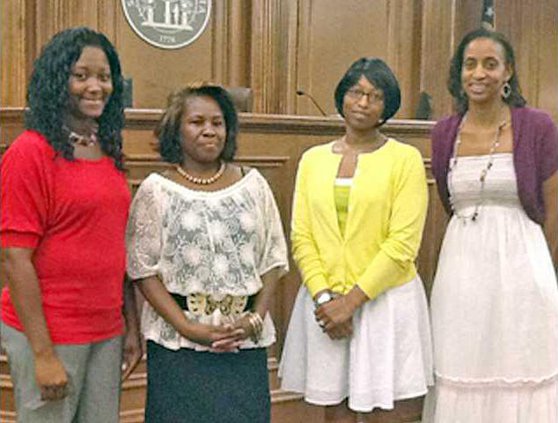Four new Court Appointed Special Advocate volunteers recently were sworn in by Judge Linnie L. Darden III. These new volunteers are part of a handful of CASAs in the area counties that advocate for the best interests of abused and neglected children who are involved in juvenile court deprivation proceedings.
“Our goal is to have a CASA for every child,” said Executive Director Petula Y. Gomillion with Atlantic Area CASA Inc. “Without CASA volunteers, many times, these children are voiceless.”
Atlantic Area CASA members advocate for children through training and with the support of community volunteers. Advocates get to know the children they work with, and they speak to everyone involved in a child’s life, including family members, teachers, doctors, lawyers and social workers.
The information they gather and their recommendations help the court make informed decisions on a child’s future.
“CASA volunteers commit to a child until the case is closed and the child is in a safe, permanent home,” Gomillion said. “They speak for the child who sometimes can’t articulate their feelings in the court system.”
The CASA program is a national volunteer movement that began in 1977, and was started in Liberty and Long counties in 1999. The Department of Family and Protective Services served 162 children from Liberty County and 40 children from Chambers County in 2009. Today, the program has grown to include support for eight local counties.
CASA’s are appointed by a judge as needed, but come January 1, Gomillion said, a new law will be in effect mandating that every child in foster care have a CASA.
“We anticipate a demand for volunteers,” she said. “There is always a need for more CASA volunteers.”
A CASA works on average, Gomillion said, 40 hours a week, without pay, before, during and after business hours building a relationship with the child. The CASA of Liberty/Chambers Counties serves 171 children, but only has 35 active volunteers.
“Our CASAs have to double up on caseloads because the need is so great,” Gomillion said. “Our goal is to have one volunteer on one case at a time.”
A CASA also ensures that children receive more individualized attention and support.
“A child needs someone who can focus solely on them,” said Paula Hall, Long County CASA volunteer. “They need somebody that has only their best interests in mind.”
Hall has been a volunteer since 2010 and currently is working on two cases. She works with a child’s caseworker to ensure that the child receives the best support possible.
“I try to help the case worker and make sure everything is taken care of for my child,” she said. “I make sure he has a book bag for school or he has his dental records when he changes school.”
A CASA volunteer also attends court proceedings and makes an independent recommendation to the judge about what is in the child’s best interests.
People interested in becoming CASA volunteers must be older than 21, willing to commit to at least one year of service, be able to attend 40 hours of CASA training and pass an extensive background check.
Go to www.atlanticcasa.org for more information about volunteering with Atlantic Area CASA or www.gacasa.org to learn more about the CASA organization in Georgia.
Child health priority for CASA volunteers
Advocates build relationships with children


Sign up for our e-newsletters


